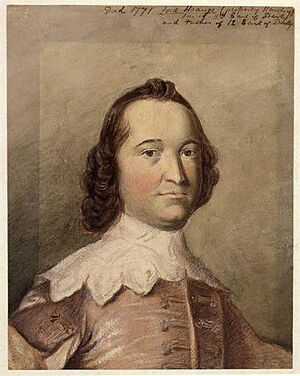James Smith-Stanley, Lord Strange facts for kids
James Smith-Stanley (1716–1771) was an important figure in British politics and military history. He was often called "Lord Strange," even though he didn't officially hold that title. James was the oldest son of Edward Stanley, 11th Earl of Derby. The title "Lord Strange" usually went to the oldest son of the Earls of Derby. However, because of old rules, this specific title had passed to female family members.
James Stanley married Lucy Smith. She was the daughter of Hugh Smith from Weald Hall, Essex. After their marriage, James added "Smith" to his last name. They had several children together. Their most famous child was Edward Smith-Stanley, 12th Earl of Derby. James Smith-Stanley passed away before his own father. This meant that the title of Earl of Derby went directly to his son, Edward.
James went to Westminster School when he was young. There, he became very good friends with John Burgoyne. Burgoyne later became a famous soldier, writer, and politician. He is known for surrendering his army at Saratoga in 1777. Burgoyne also wrote a special play for the wedding of James's son, Edward. Edward married Lady Elizabeth Hamilton.
Public Service and Politics
James Smith-Stanley served in the British government for many years. He was a Member of Parliament (MP) for Lancashire. He held this position from 1741 until he died. An MP is a person elected to represent an area in the country's parliament.
In 1762, he became the Chancellor of the Duchy of Lancaster. This was a special role in the government. He also became a Privy Councillor at the same time. This meant he was a trusted advisor to the King.
Leading the Lancashire Militia
During the Seven Years' War, James Smith-Stanley had another important job. He was the Lord Lieutenant of Lancashire. This role made him responsible for the local army, called the Lancashire Militia. This militia had not been active since 1746.
Lancashire was asked to provide one regiment for the war. James was very keen to get the militia ready. By July 1760, about 60% of the soldiers were ready. They were then given their weapons. James was made the Colonel of the regiment on July 15, 1760. The regiment officially started full-time service in December that year.
In October 1761, King George III gave the regiment its special flags. He also gave it the title 'Royal Lancashire Militia'. James's own company of soldiers became known as 'the King's Company'. The war ended, and the regiment stopped full-time service in December 1762. However, James remained its Colonel for the rest of his life.
Later Political Influence
In the 1760s, James Smith-Stanley was also involved in important international matters. He was mentioned as a special representative to Paris. He advised William Pitt, a very important politician. This was during the time leading up to the Treaty of Paris (1763). This treaty officially ended the Seven Years' War.
 | Aaron Henry |
 | T. R. M. Howard |
 | Jesse Jackson |


